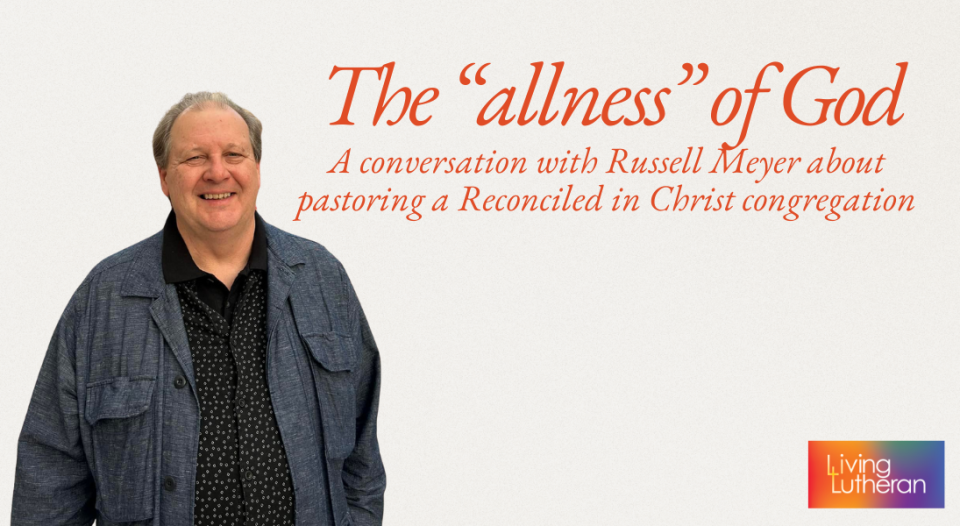Russell Meyer, intentional interim pastor of St. John Lutheran Church in Jacksonville, Fla., considers his vocation to be creating welcome for all people.
St. John, a historically African American congregation located in Jacksonville’s Springfield Historic District, was pastored by Victoria and William Hamilton for 20 years before they retired and Meyer was installed. Its designation and ministry as a Reconciled in Christ (RIC) congregation is consistent with Meyer’s vocational approach. “The RIC movement is directly related to welcoming people for how they identify themselves, not for how society wants to categorize them,” he said.
“Our identity is deeply tied to both being Reconciled in Christ and in outreach to the neighborhood, which is still principally African American,” Meyer said.
In addition to serving with other RIC congregations in the Tampa Bay area, Meyer has been actively involved in racial justice ministry and gender justice ministry. He is the former president of White Lutherans for Racial Justice and current executive director of the Florida Council of Churches. The council, he said, supports “a holistic vision in public policy and in Christian expression for all people to be able to find their identity affirmed in Christ, as God has made that known to them.”
Meyer considers that vision a core element of Christian witness. “Helping people to be able to affirm what they really know about themselves, and to feel Christ’s embrace in that affirmation, is a central part of pastoral care and the witness of the gospel,” he said.
St. John also maintains a strong working relationship with a nearby Missionary Baptist congregation, which includes their shared planning of a jazz and blues festival that will raise awareness and funding for unhoused people in the community. St. John is also converting its parsonage into discount housing for students of historically Black colleges nearby. “We’re living what it means to be a Black congregation in the community, not just inside” the church, Meyer said.
During his vocation as pastor, Meyer has come to understand that pastoral care has both a personal component and a structural one. “I was trained for pastoral care that was very much under a therapeutic model,” he said. “And the difficulty with that conception of pastoral care is that it really reduces it to helping people cope with … oppressive social structures.”
Pastoral care, he said, must be about not only holding people’s hands but also locking arms with them in seeking justice for their well-being. “If there are structures that are preventing people from experiencing the flourishing of God—which is God’s will for them and is essential for their expression of their own dignity, both as individuals and as members of a community—then those structures have to be addressed.”
Meyer pointed to long-standing openly LGBTQIA+ members of St. John’s leadership team as being important to the congregation’s identity. He cited a transgender member who had been rejected by other church communities but is now “very visible, fully participating in the whole life of the congregation, embraced by the membership.” St. John, he said, has “a number of people whose gender identities are completely affirmed” by the congregation.
St. John also hosts the largest Narcotics Anonymous meeting in the county, with a couple of smaller offshoot meetings as well. “One of those meetings is particularly geared toward queer and gender issues that contribute to people’s journeys through addiction,” Meyer said.
Meyer believes that even though issues of identity are often placed along a social or political continuum, a pastoral approach honoring all members can bring people together more than it divides them. “There’s a way of addressing the issues out of a sense of pastoral care, out of a basis of the profound love that the gospel represents, that can bring people together, in spite of where they might find themselves on the social spectrum.”
He believes that rather than demonize people for their misconceptions of others, congregations should help them move beyond that misunderstanding to see others for who they are.
“When we say ‘all,’ we mean all, and we want to help everyone find their way to embracing the ‘all,’” Meyer said of St. John. “That’s essential as the goal for being Reconciled in Christ. We want to live out the ‘allness’ of God as fully as possible in our community life.”
It’s an ongoing project of learning for members, he said. “In that learning, the Holy Spirit speaks to us in powerful ways that broaden and open up our faith in ways we would have never been able to conceive of on our own. We really need the other to experience the fullness of the Spirit in our midst.”







